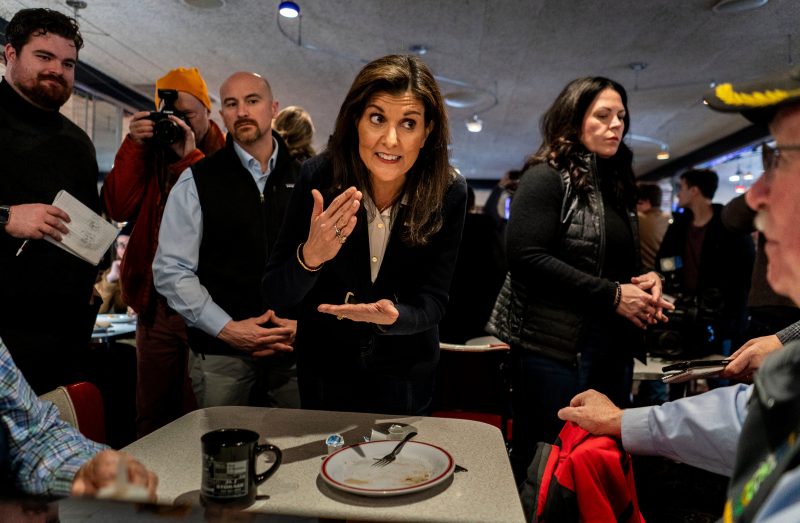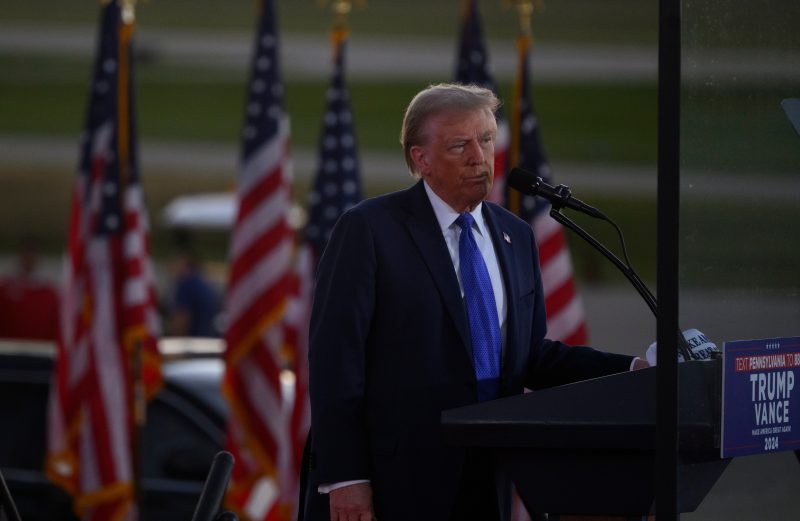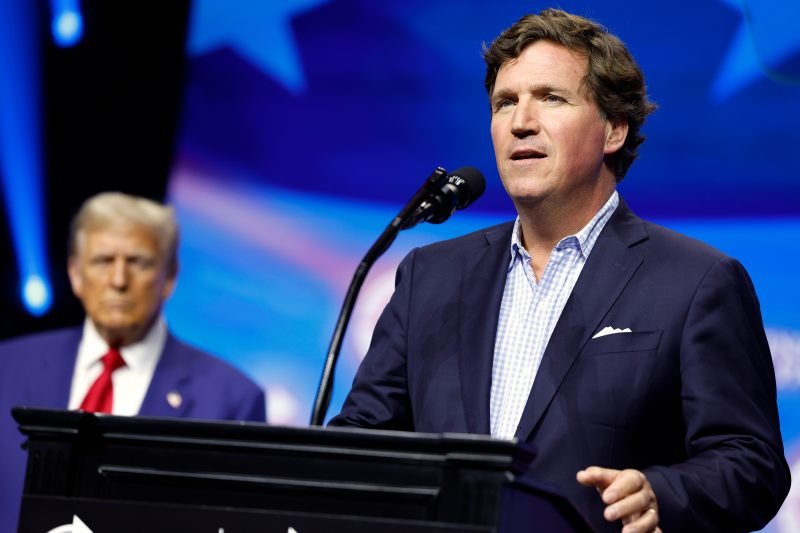Trump lobs racially charged attacks against Haley ahead of N.H. primary

Former president Donald Trump is lobbing racially charged attacks at Republican rival Nikki Haley, a daughter of Indian immigrants who served as his U.N. ambassador, days before a hotly contested New Hampshire primary that could determine the trajectory of the party’s nominating contest.
In a lengthy post on his social media platform Friday, Trump gave his GOP rival a nickname that appeared to be yet another racist dog whistle.
Writing on Truth Social, Trump repeatedly referred to Haley as “Nimbra,” an apparent intentional misspelling of her birth name. Haley, whose parents moved to the United States in the 1960s, was born Nimarata Nikki Randhawa.
Reminiscent of his spurious claims about former president Barack Obama’s citizenship, Trump also last week spread a false “birther” claim about Haley when he shared a post on Truth Social from the Gateway Pundit, a far-right website that propagates baseless accusations.
The post falsely suggested Haley was ineligible to be president or vice president because her parents were not U.S. citizens when she was born. This is not true. The Constitution states that a natural-born citizen can be president, and Haley automatically became a U.S. citizen when she was born in South Carolina in 1972.
Trump’s use of Haley’s birthname comes as the topic of racism has emerged as a flash point among Republicans on the campaign trail, with Haley recently asserting that the United States is not and never was a racist nation. She earlier stirred controversy for comments in which she initially did not identify slavery as the cause of the Civil War.
Friday wasn’t the first time Trump has mocked Haley’s name. After the Iowa caucuses on Monday, Trump embarked on a tirade against Haley, misspelling her given first name.
“Anyone listening to Nikki ‘Nimrada’ Haley’s wacked out speech last night, would think that she won the Iowa Primary,” Trump wrote on Truth Social. “She didn’t, and she couldn’t even beat a very flawed Ron DeSanctimonious, who’s out of money, and out of hope. Nikki came in a distant THIRD!” (DeSanctimonious is a Trump nickname for another GOP rival, Florida Gov. Ron DeSantis.)
Even before the campaign began, Haley repeatedly stated that she has always gone by her middle name, which is Punjabi for “little one,” and that she changed her last name to Haley after marrying her husband, Michael Haley.
Trump, whose mother migrated to the United States from Scotland, has a history of using a rival’s name or background as a tool in his efforts to make rivals sound like they are not fully American. During the 2016 presidential race, he referred to Sen. Ted Cruz (Tex.), who was then a GOP presidential candidate, by his first name, Rafael. He also repeatedly mispronounced and drew out the first name of Kamala D. Harris, now the vice president, on the 2020 campaign trail.
Trump also built favor with the extreme right of the Republican Party when, in 2011, he began floating racist and baseless claims about President Barack Obama not being born in the United States, and he frequently emphasized Obama’s middle name, Hussein.
Asked Friday on the campaign trail if Trump’s attacks against her are racist, Haley said in New Hampshire that she would “let the people decide” what the former president means.
“He’s clearly insecure. If he goes and does these temper tantrums, if he’s going and spending millions of dollars on TV, he’s insecure, he knows that something’s wrong,” Haley said. “I don’t sit there and worry about whether it’s personal or what he means by it.”
When asked about Trump repeatedly referring to Haley as “Nimbra,” Trump campaign spokesman Steven Cheung said in an email to The Washington Post, “Can you tell me how [Trump’s Truth Social] post would even be construed as racist?”
When provided with a list of examples of how Trump has tried to “otherize” his foes by emphasizing their race or background, Cheung added, “Sounds like those who take offense are engaging in faux outrage racism. They should get a life and live in the real world.”
Civil rights leaders denounced Trump’s remarks as a racist appeal to White people, who make up more than 92 percent of the population in New Hampshire, according to the latest Census figures.
Elder James Johnson, head of the Racial Justice Network in South Carolina, said Friday that Trump’s remarks are his way of saying “she is not one of us, that she is a Brown person, that she is not a White person.”
By referencing the birth name Haley has not used in public life, Trump is “sending a message to white nationalists,” Johnson said, who offered that he is “not a fan” of Haley overall.
Another civil rights activist said the racism behind Trump’s behavior is obvious.
“Why is he actually even using this name? What purpose does it serve?” asked Anthony Poore, president and CEO of the New Hampshire Center for Justice and Equity, a racial and social justice organization.
Poore said Trump’s record — dating back to when he and his father were found guilty of housing discrimination against Black people, to attacks on Obama’s place of birth — make clear what he is doing.
Trump “uses white supremacy to advance his political agenda,” Poore said, adding that the former president is “using these bogeymen — or ‘bogeynames’ — to rile up hatred.”
The attacks on Haley come as she has continued to defend the notion that the United States is not a “racist country” and has “never been a racist country.”
“Are we perfect? No,” Haley said on Fox News on Tuesday. “But our goal is to always make sure we try and be more perfect every day that we can.”
Haley was responding to a question about a viral moment from MSNBC host Joy Reid, who on Monday said the former governor is “still a Brown lady that’s got to try to win in a party that is deeply anti-immigrant. … I don’t see how she becomes the nominee of that party.”
Haley said she and Reid must live in “different” Americas. Haley’s father, Ajit Singh Randhawa, is a professor of biology who got his PhD at the University of British Columbia and later moved to Bamberg, S.C., a segregated town where Haley was born, to teach at nearby Voorhees College — a historically Black university.
Haley told Fox News that although she faced racism as a “Brown girl that grew up in a small rural town in South Carolina,” she became “the first female minority governor in history, who became a U.N. ambassador and who is now running for president.”
“If that’s not the American Dream, I don’t know what is,” Haley continued. “You can sit there and give me all the reasons why you think I can’t do this. I will continue to defy everybody on why we can do this, and we will get it done.”
During a CNN town hall Thursday night, Haley defended her characterization of the country after host Jake Tapper pressed her on America’s history, noting that the country had been founded on “many racist precepts,” including slavery.
“We had plenty of racism that we had to deal with,” Haley responded, referring to her childhood in a small rural town. “But my parents never said we lived in a racist country. And I’m so thankful they didn’t. Because for every Brown and Black child out there, if you tell them they live or were born in a racist country, you’re immediately telling them they don’t have a chance.”
She acknowledged that America had its “stains” but said that “national self-loathing” was “killing” the United States.
“I want every Brown and Black child to see that and say, ‘No, I don’t live in a country that was formed on racism. I live in a country where they wanted all people to be equal, and to make sure that they had life, liberty and the pursuit of happiness,’” Haley told CNN.
Trump’s emphasis on Haley’s birth name and his questioning of his eligibility to run for president have mostly been isolated to social media.
At his campaign rallies, Trump has used the nickname “Birdbrain” to refer to Haley but hasn’t made changes to her actual name or suggested she isn’t eligible to be president. He has ramped up his attacks on Haley in recent weeks, ahead of the New Hampshire primary, where she is polling second and has the endorsement of Gov. Chris Sununu (R).
Marianne LeVine, Dylan Wells, Mariana Alfaro and Aaron Blake contributed to this report.



